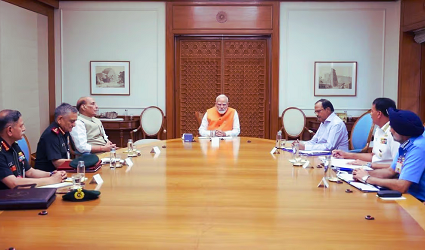Modi grants the Indian military autonomy to take action against terrorists.

On Tuesday, Indian Prime Minister Narendra Modi convened a high-level security meeting at his residence following the deadly attack in Pahalgam.
During the conference, he conferred upon the three branches of the Indian armed forces full operational autonomy to undertake decisive measures against terrorism.
The meeting included Indian Defence Minister Rajnath Singh, Chief of Defence Staff General Anil Chauhan, National Security Advisor Ajit Doval, Army Chief General Upendra Dwivedi, Navy Chief Admiral Dinesh K Tripathi, and Air Force Chief Air Chief Marshal Amar Preet Singh.
Modi affirmed India’s national commitment to deliver a decisive strike against terrorism and expressed complete trust in the proficiency of the Indian military forces.
He affirmed that the military forces possessed full authority to decide the timing, method, and targets of their response.
Modi convenes with Amit Shah
Following the security assessment, Union Home Minister Amit Shah visited Modi’s house. The two leaders allegedly deliberated on several strategic matters, indicating that the government is preparing a significant response to the terror incident to convey a robust message to the offenders.
Cabinet meeting convened in response to rising tensions
The essential security meeting occurred one day prior to Modi’s scheduled chairing of a comprehensive cabinet session on Wednesday. The forthcoming cabinet meeting is anticipated to conclude significant decisions and action plans regarding the Pahalgam attack.
These elevated discussions constitute a sequence of ongoing extensive sessions including senior ministers, high-ranking government officials, and leaders of security and intelligence agencies.
Unanimous bipartisan endorsement for a robust response
The Modi administration convened an all-party meeting to inform political leaders regarding the issue. The opposition shown uncommon solidarity by offering complete support for any serious measures the Centre may implement against the perpetrators of the Pahalgam attack.
India implements diplomatic and strategic actions against Pakistan.
Subsequent to the Pahalgam assault, the Indian government has commenced the execution of robust punitive actions against Pakistan.
The initial measures implemented include the suspension of the Indus Water Treaty, a directive for all Pakistani nationals to exit India, further deterioration of diplomatic relations, and the expulsion of further personnel from Pakistan’s High Commission.